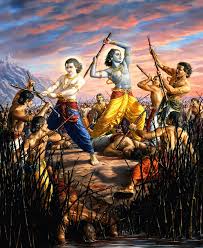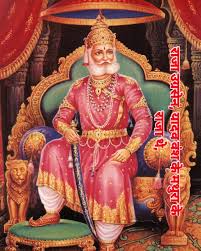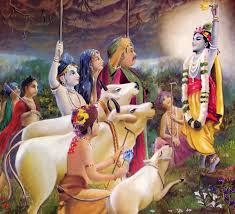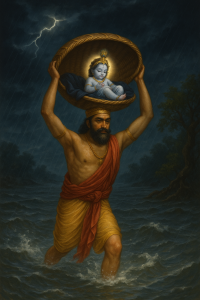The Seed of Destruction Is Sown
After many years of divine pastimes, victories, and spiritual teachings, Lord Kṛṣṇa’s earthly mission approached its end. The purpose for which He had descended—to reduce the burden of the earth, destroy the wicked, and protect dharma—had been fulfilled.
Yet, one final act remained: the departure of the Yādava dynasty, which had grown too powerful and arrogant. Even though they were devotees and family members of the Lord, many had become intoxicated by strength and pride.
Thus, by the will of the Supreme, a mysterious curse unfolded.
The Curse of the Sages
One day, the young Yādava princes, desiring to mock the sages Viśvāmitra, Nārada, and Kaṇva, dressed Sāmba as a pregnant woman, placed a club inside his clothing, and asked:
“O venerable sages, this woman is about to give birth. Can you tell whether the child will be a boy or a girl?”
The sages, offended by their arrogance, pronounced a terrible curse:
“This ‘woman’ will give birth to a terrible iron club that will destroy your entire dynasty!”
Frightened, the Yādavas reported everything to Kṛṣṇa. The Lord, smiling gravely, acknowledged the inevitable.
“That which is destined will happen.”
The Iron Club and the Grass Blades
Soon, Sāmba indeed delivered a massive iron club from his belly. Terrified, the Yādavas ground it to powder and threw it into the sea. But the iron dust turned into blades of sharp reeds along the coast, and one unbreakable piece remained, which was later taken up by a hunter named Jara.
The Lord knew: this would be the weapon of destiny.
The Curse Comes True
Some time later, the Yādavas gathered on the coast of Prabhāsa for a grand festival. After drinking wine and losing control, they began to quarrel among themselves. Old insults surfaced, tempers flared, and suddenly, in a frenzy, they grabbed the blades of the iron reeds.
Mad with intoxication and rage, they began to slaughter one another. Fathers struck sons, brothers killed brothers, and soon, the once-mighty Yādava race lay lifeless upon the earth.
Balarāma, witnessing this horror, sat in meditation and departed from this world, returning to His eternal abode as Ananta Śeṣa.
The Departure of Lord Kṛṣṇa
After fulfilling every divine task, Lord Kṛṣṇa walked alone into the forest, serene and detached. He sat beneath a tree, immersed in meditation, awaiting the ordained moment.
At that time, the hunter Jara, mistaking the Lord’s lotus foot for a deer’s ear, shot an arrow, piercing the Lord’s foot.
Realizing his mistake, Jara ran and fell at Kṛṣṇa’s feet, crying:
“O Lord! I did not know! Forgive me!”
Kṛṣṇa smiled compassionately:
“Do not fear. This act was destined. You have helped conclude My earthly play.”
Thus, the Supreme Lord withdrew His visible form, ascending to His eternal realm of Goloka-Vṛndāvana, invisible to mortal eyes but eternally accessible to the hearts of His devotees.
The Mourning of Arjuna
Hearing of these events, Arjuna arrived in Dvārakā. Overwhelmed by grief, he gathered the surviving queens and children. But his strength had faded. When attacked by bandits on the journey, he could no longer lift his bow Gāṇḍīva with the same power, nor invoke his celestial weapons.
He realized the truth:
“Now that Kṛṣṇa has left this world, all my power has departed with Him.”
Arjuna led the Yādava women to Indraprastha and placed Kṛṣṇa’s grandson Vajra on the throne.
The City Sinks into the Ocean
As Arjuna departed, Dvārakā sank into the ocean, its walls, towers, and palaces engulfed by waves—as foretold by Kṛṣṇa Himself. The divine city of Dvārakā had completed its role in the Lord’s pastimes and returned to the sea.
Lessons to Be Learned:
- Even the most powerful devotees can fall when pride replaces humility.
- The Lord’s plans are perfect, even in destruction, for they lead to renewal.
- Kṛṣṇa does not disappear—He simply withdraws His visible form, remaining eternally present for the devotee who calls upon Him with love.
- Like Arjuna, our strength lies not in weapons or might, but in our connection to the Lord.
- The end of the Yādava dynasty is not a tragedy—it is the closing chapter of a divine drama, orchestrated by the Supreme for the ultimate good of the world.
Origin of the Story: Harivaṁśa Purāṇa – Bhaviṣya-parva, Chapters 1–15



